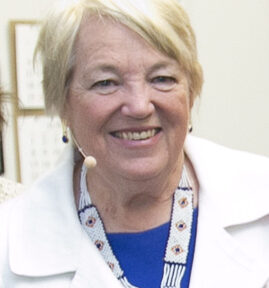
Heidi Hartmann
: Photo from Wikimedia Commons / Author of Photo: Photo by Katherine Taylor for The US Department of LaborOverview
* Founder and president of the Institute for Women’s Policy Research
* Has taught at Rutgers University and George Washington University
* Vice chair of the National Council of Women’s Organizations
* Advocates “equal pay for comparable work” for women
Heidi Hartmann is the founder and president of the Institute for Women’s Policy Research (IWPR), which professes to be “a public policy research organization dedicated to informing and stimulating the debate on public policy issues of critical importance to women and their families.” The Rockefeller Family Fund describes this group as “a research backbone of the women’s movement.” IWPR states that it “specialize[s] in the use of quantitative techniques and original research, interpreting the data through the lens of the special conditions of women’s lives, paying close attention to gender and racial disparities.” It works with women’s advocacy groups to publicize its findings, which largely contend that women in America are victims of widespread discrimination and face imposing social and economic hurdles that men are largely spared.
Prior to founding IWPR, Hartmann – an economist with a B.A. from Swarthmore College and a Ph.D. from Yale University – was the Director of the Women’s Studies Program at Rutgers University and was a member of the graduate faculty at the New School for Social Research. She is currently a Research Professor of Women’s Studies at George Washington University. She is also a Steering Committee member of the National Committee on Pay Equity; a Board member of the Coalition on Human Needs; and the co-chair of the Economists’ Policy Group on Women’s Issues. Moreover, she is a past recipient of a MacArthur Fellowship Award, granted by the John D. and Catherine T. MacArthur Foundation.
Hartmann is the co-author of several economic reports, including: “Who Needs a Family Wage?: The Implications of Low-Wage Work for Family Well-Being”; “Women’s Access to Health Insurance”; “Unnecessary Losses: Costs to Americans of the Lack of Family and Medical Leave”; “Combining Work and Welfare: An Alternative Anti-Poverty Strategy”; and “The Impact of Social Security Reform on Women.”
She participated in a 2001 National Press Club event in Washington, D.C. contesting the legitimacy of George W. Bush’s presidency. Lamenting Bush’s allegedly anti-woman policies, Hartmann demanded that women be given “equal pay for comparable work.” That is, she advocated a policy which would guarantee that “women in such careers as nursing would be paid the same amount of money as men in careers such as engineering.” “This is a huge opportunity for Progressives to go after not just equal pay for equal work,” Hartmann said, “but equal pay for comparable work.” Hartmann believes that workers’ wages should be determined by “looking at the content of jobs and seeing” how much each contributes to the nation at large – a most subjective criterion.
Hartmann is also the vice-chair of the National Council of Women’s Organizations (NCWO), which views the United States as a nation rife with injustice directed against girls and women. NCWO characterizes its policy agenda as one that aims to develop “a society free from the inequality, oppression, and discrimination that face women and girls from a variety of backgrounds and experiences.” To achieve its ends, NCWO advocates ever-increasing taxes, explaining that “the government must have adequate resources to invest in the needs of its citizens” – those needs being, in NCWO’s view, synonymous with NCWO objectives. Above all else, NCWO advocates high levels of spending for social welfare programs, which it terms “humane welfare policies.”